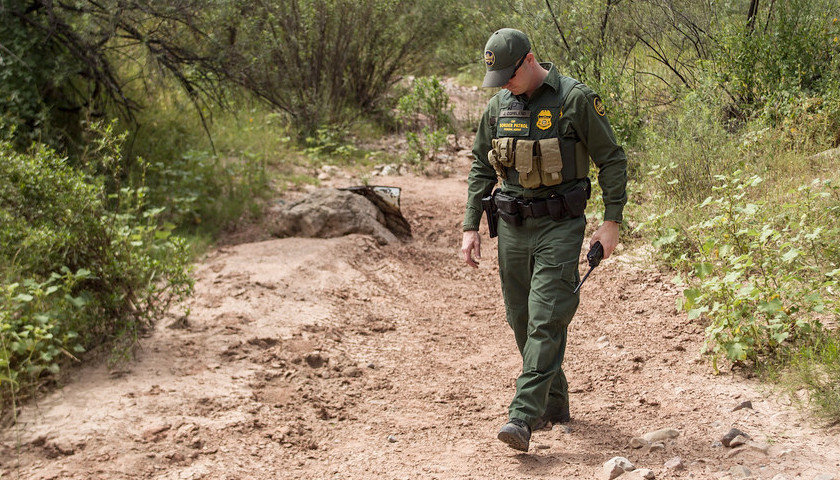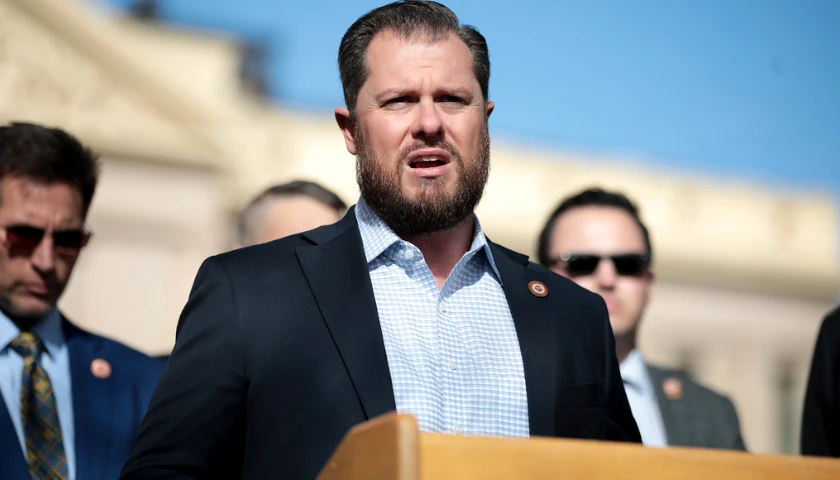by Steven Richards
The nearly 10,000 border patrol agents eligible for retirement by 2028 and static recruitment numbers threaten to undermine future efforts to secure the Southern border, even as the current immigration crisis escalates.
By 2028, a total of 9,828 current border patrol agents will be eligible for retirement, according to numbers provided to Transport Dive by a Customs and Border Protection official. The agency, which has been plagued by a recruitment shortfalls for years, says it is preparing to deal with the fallout if even a fraction of the eligible agents retire on schedule.
Agency policy requires a border patrol officer to retire when he or she reaches 57 years of age and has 20 years of Law Enforcement Officer (LEO) service, according to the agency’s website. Customs and Border Patrol did not share the size of this cohort with Just the News after inquiries, but did share the agency’s work to improve recruitment numbers.
From 2001 to 2007, the Bush administration significantly expanded the border patrol force, adding approximately 6,000 agents, according to the administration. It also had plans to further expand the force to 18,000 agents by the end of 2008, according to an archived version of an administration plan for comprehensive immigration reform published in 2007.
“We have more than doubled border security funding from $4.6 billion in FY 2001 to $10.4 billion in FY 2007,” the Bush administration posted to the White House website. “We will have also increased the number of Border Patrol agents by 63 percent,” the statement continued.
At the 20-year mark of the end of the Bush administration in 2028, many of those agents recruited during that time period will reach the mandatory end of their service, according to agency regulations.
The Republican House Oversight Committee concluded that the policies of President Biden are “exacerbating staffing challenges” and leading to reduced morale on the force. When President Joe Biden entered office in early 2021, he immediately paused almost all deportations, signaling a reversal of his predecessor’s immigration policy, which focused on more strict enforcement of U.S. laws.
Throughout his administration, the number of immigrant crossings has more than doubled than those taking place during the Trump administration and have strained the system in place at the border, with far-reaching consequences.
Self-described “Sanctuary Cities” have also felt the strain. New York City Mayor Eric Adams told The New York Times that the crisis “will destroy New York City” and pleaded with the federal government for more funding. PBS reported that along with Adams, the mayors of Chicago, Denver, Houston, and Los Angeles have been pressing to meet with President Joe Biden about getting federal help in managing the surge of immigrants.
A report from the Department of Homeland Security’s Office of Inspector General (OIG) highlighted at an Oversight Committee hearing last year—appears to confirm the symptoms, if not the cause that House Republicans highlight. After interviewing over 9,000 border patrol agents, OIG found that staffing challenges and increased workloads have led to decreased morale.
The DHS Inspector General’s investigation found that, since 2019, “shifts in U.S. immigration and border security policies, migrant surges, COVID-19, and the overall rising number of migrant encounters along the Southwest border have exacerbated staffing challenges,” requiring CBP to use the same number of agents to carry out more assignments. Agent numbers have remained relatively steady since 2019, while responsibilities have increased, according to the report.
You can read the report below.
The thousands of border patrol agents the DHS OIG interviewed shared concerns about lower morale and being overworked. Because of the increased workload and extra assignments, health and morale are negatively impacted and agents feel that they are not able to carry out primary law enforcement duties, the report concluded.
The Inspector General told Congress that the staffing issues are impacting border patrol’s overall mission, to stop human trafficking, prevent drug smuggling, and illegal activity at the border.
The Biden administration is shifting its position on the southern border, at least rhetorically, by calling for Congress to pass a new immigration law that would increase funding for security and give the president new powers to shut down the border. This new stance comes after Texas, supported by other Republican states, exerted a state’s “right to self-defense” to secure its own border in the face of federal inaction.
A spokesperson for Customs and Border Patrol shared several efforts by the agency to incentivize new recruits and revitalize the recruitment process, which make up part of the Biden administration’s border security efforts. The spokesperson, who declined to be named, said that earlier this month, the CBP increased the recruitment bonus to $20,000 for new border agents, that the agency is also expanding its outreach online through job boards, online webinars, and social media to encounter people “where they are” in the modern day in an effort to boost recruitment numbers.
The spokesperson also said that CBP plans to hire 200 national recruiters to recruit applicants into law enforcement positions. It is these positions specifically that are set to encounter retirement waves over the next four years.
In a press release announcing the change, the border patrol chief described the remote nature of the job as one of the hurdles for finding new recruits. “Getting into law enforcement can be difficult. Often, candidates must be willing to move to a new location,” Jason Owens, Chief of the U.S. Border Patrol, said according to the press release.
For this reason, CBP plans to offer new recruits who accept assignments at the most remote locations along the border—such as Presidio, Texas and Ajo, Arizona—additional incentives to take the job.
“The ability to safeguard our borders and keep Americans safe is our top priority at CBP and to do that successfully we must attract qualified candidates to fill critical positions,” said Assistant Commissioner Andrea Bright of CBP Human Resources Management.
“To address ongoing recruiting challenges and remain competitive with other law enforcement organizations, CBP is now offering a $20,000 recruitment incentive for all newly appointed Border Patrol agents who successfully complete the academy and three years of service. Another $10,000 will be paid if the agent accepts a remote location,” she continued.
The CBP declined to address the retirement wave specifically or provide any data on the agency’s staffing outlook taking into account expected retirements and recruitment.
The National Border Patrol Union, the labor union that represents the interests of United States Border Patrol Agents, did not respond to a request for comment from Just the News.
The union has been critical of the Biden Administration’s border policy. The union decried “mass releases” of immigrants into the country and blames Biden for the surge of immigrants crossing the border. The union has also explicitly called for former President Trump to be elected for the second time in 2024 over incumbent President Biden.
– – –
Steven Richards joined Just the News in August 2023 after previously working as a Research Analyst for the Government Accountability Institute (GAI) in Tallahassee, Florida. He is a two-time graduate of Florida State University with a Masters in Political Science and a B.S. in International Affairs.








